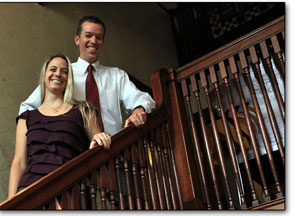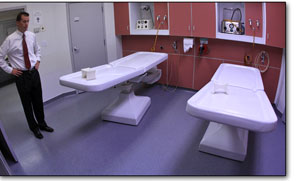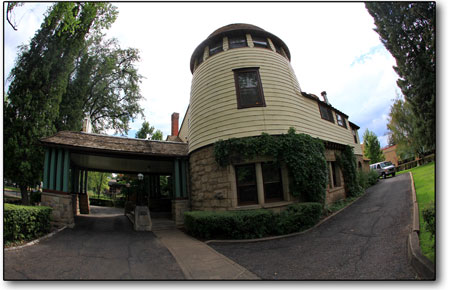It’s a fine line between life and work for owners of Hood Mortuary
by Tracy Chamberlin
On a night like any other, the family sits down for dinner. Mom talks about her day, taking classes at Fort Lewis College. Her daughter, a future fashionista, wonders what she’ll wear to school the next day.
And Oscar the dog sits patiently nearby, waiting for someone to accidentally drop a bite of the main course. That’s when dad suddenly jumps to his feet and runs downstairs, realizing that he left the crematorium on.
Perhaps only one family in Durango could imagine that happening in the real world, the Phelps family. They not only own
 |
|
Ryan and Kristal Phelps were high school sweethearts and already a pair before Hood Mortuary came into their lives in the 1990s./Photo by Steve Eginoire
|
and operate Hood Mortuary, they call it home.
Ryan Phelps never expected or planned on working at a mortuary. As he tells it, “Instead of me searching for something, this found me.”
The native Texan first came to Durango in the early 1990s to attend Fort Lewis. Like many of his classmates, he went looking for work. That’s when he met Bill Dunn, the previous owner of Hood Mortuary.
After a few years, Phelps began working full time at Hood and moved into a management position. Dunn helped him attend Mortuary School in Houston, eventually selling him the business in 2005.
The two still keep in touch, often talking business over breakfast. So Phelps gets to have two men in his life he looks up to, Dunn and his own father back in Texas.
And when running a small business, there’s never too much support. One day he might be working on the website or doing some bookkeeping with his wife, Kristal.
Another day could be filled with installing new carpet, while the next he’s back in a suit and tie as a funeral director.
Phelps considers himself well-suited to run this type of business, which often takes a Jack-of-all-Trades. “I do have many skill sets,” he admits. “But I’m master of only a few.”
It also takes the right kind of mentor and training. Phelps described the first time he observed the embalming process. “I would step into the room and they would very gingerly explain what they were doing,” he said.
He admits there were hurdles to overcome along the way, but the training he received from his mentors made the difference. Today when he puts on the latex and begins the process himself, he said it creates a separation that allows him to get the job done.
Unfortunately, Phelps has seen the business from the same side as his customers. After losing a friend in a car accident while working under Dunn, he sat in the chapel just where many others have.
Those moments helped him come to a place where he could handle the challenges of the business and overcome those hurdles.
“Death is a great mystery,” he said. “… No one knows what happens to us for sure.”
But, the knowledge, experiences and mentoring he’s received over the past two decades gave him the tools needed to help others with what can often be their most challenging times.
For his family, the biggest challenge isn’t actually living at the mortuary, it’s never being able to leave work.
His wife, Kristal, said she was able to get accustomed to it before moving in. She and Phelps were high school sweethearts and had been together long before the job became a part of their lives. Their daughter, Sara, was born after they moved in, so she’s always called it home.
According to Phelps, his daughter used to hate living at Hood, often asking if she could hang out at her friends’ homes. But, not any more.
Just the other day Sara told her father she loves living there. After all, she gets to enjoy having a large, extended family that includes all of the Hood employees. Something not everyone else has.
Kristal, on the other hand, is on the fence. Living at Hood has both its advantages and disadvantages. When her husband needs to run to the office, it’s a short trip. Then again, he’s never off the clock.
“Work comes first,” she explained, “cause it’s always a life or death situation. That’s the hard part.”
One benefit of living at work is also living on historic East Third Avenue, which Kristal describes as beautiful. The home was built in the 1880s and didn’t become a mortuary for another 50 years.
Phelps keeps the building maintained and updated, like the new carpeting. He also worked on the first floor chapel area, adding subtle and sophisticated stained glass pieces designed by Henry Keck, an understudy to the famous Louis Comfort Tiffany.
The building isn’t the only thing that has changed over the years. In just the past two decades that Phelps has been at Hood, the industry has changed a great deal.
When he first started, the cremation rate in Colorado was likely 20 to 30 percent. Today, he estimates that in Durango about 90 percent of his business is cremation.
It’s often considered more cost effective than traditional services, which sometimes means less money for Phelps. But he’s proud of how he treats his customers and thinks Hood has some of the best prices.
The process of cremation is also viewed as better for the environment. But that point is debated.
A new process in the industry is something Phelps thinks is even better for the environment. It’s called resomation, or alkaline hydrolysis.
The relatively new method utilizes lye, heat and high pressure to reduce the body down to a liquid in just about two hours. What’s left behind are the bones, which are dried and given back to the family.
The Mayo Clinic in Phoenix is one of a handful of current practitioners across the United States. The reason this method hasn’t caught on yet is that the liquid is normally disposed of through the sewer system, which can be a challenging thought for loved ones.
Phelps prefers describing it as not going down the drain, but floating in the Animas, swimming along with a school of rainbow trout.
He explained why he thinks it has a positive impact on the environment. There are no carbon emissions and the liquid has a "neutralizing" effect on the pipes, which is also good for the environment.
Phelps doesn’t see the process taking hold on the industry within the next five years, although state law does allow for it. Currently, there are no practitioners in Colorado and he would like to be the first.
With Durango being such an environmentally conscious town, he thinks it’s something that could work here. But, as the owner of Hood and a representative of industry, it all comes back to the customer.
“I want to treat people how I want to be treated,” he said. “What the people want is what you’ve got to do.”
 |
|
Ryan Phelps, in Hood Mortuary’s “prep room,” admits there were hurdles to overcome along the way, but the training he received from his mentors made the difference./Photo by Steve Eginoire
|



